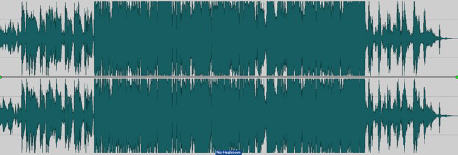“Should I limit or compress the stereo mix before mastering?”
Compression on individual channels is pretty much essential in modern music production, however if you’re just starting out in the world of mixing, I would suggest going easy on your master bus processing. Of course some compression is fine if it’s adding a pleasing aesthetic, but if it’s just there for the sake of level, I’d recommend taking it off. Brick-wall limiters or any kind of clipping should certainly be switched off before rendering your final bounce. Don’t be concerned if your mixes are not peaking at zero or if they sound quieter than reference tracks you may be listening to. Your mastering engineer will no doubt have access to some of the world’s best compressors on hand, so they will take care of the final volume at the appropriate stage during mastering. If you’ve been mixing into compression and feel it has become an integral part of the mix, it’s best to send 2 prints of the final mix. One with and without the master bus compression.
Even though we can never judge a mix based on how it looks, below is a typical example of what appears to be a healthy looking mix to present for mastering. Plenty of headroom for equalisation and other processing at the mastering stage.

The waveform below is an example of a mix with little to no headroom. Not an ideal mix to be presenting the mastering engineer with.

Mixes like the one above can present several pitfalls at the mastering stage;
- The sheer lack of headroom simply means that the mastering engineer cannot work as effectively on the mix.
- If a mix needs equalisation, this often sounds best ‘before’ not after compression. Applying another stage of compression after the equalisation is not ideal as this will simply result in a master that is severely overcompressed.
- Compression can often work hand in hand with other mastering processes, so removing this option at mastering restricts creative choices.
- The mastering engineer could have a different idea of dynamic processing to the one you had. It could be a different style of compression, such as upward compression or a completely different method such as parallel compression. These options are removed if the mix is already compressed to the point where it can handle no more.
- If a mix has brickwall limiting but requires additional equalisation, this will result in ‘peaks’ being regenerated and therefore another stage of limiting is required. Not ideal at all.
I need to be clear in stating that these tips are aimed squarely at newer engineers. They have enough moving parts to deal with in the mix itself. I feel master bus processing is something to grow into once you’ve reached a high standard of mixing. We all read about the top tier engineers placing all kinds of processors on their master bus, but rest assured they have got a ton of mixes under their belt and are operating at ‘expert’ level. Even still, many seasoned engineers I deal with regularly send me mixes with and without their bus processing just in case they’ve ‘over cooked’ it somewhere. You can get a few more tips on preparing your mixes for mastering here: https://crystalmastering.com.au/music-mastering/prepare-mixes-mastering/

Written by Joe Carra`
With over 30 years of experience in the mastering field, Joe is the sole director & chief mastering engineer at Crystal Mastering. A Grammy nominated audio engineer, Joe is also a founding member of MPEG (Music Producer & Engineer’s Guild of Australia). Over the years, Joe has had the privilege of mastering numerous ARIA award-winning albums, and his work has amassed over 3.5 billion streams. Aside from his regular mastering duties, Joe can also be found giving guest lectures at various audio colleges in his area.

